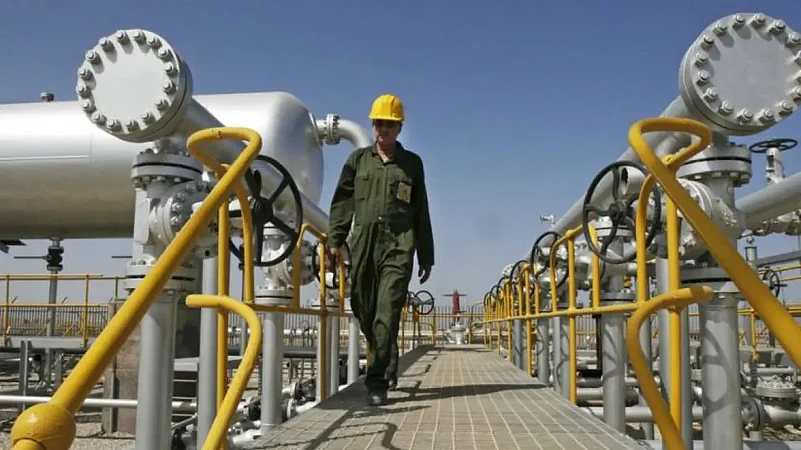US Treasury Secretary Janet Yellen has said the United States is okay with India buying Russian oil even above the price cap that US-led bloc is imposing.
However, Yellen said that India would have to use non-Western shipping, insurance, and financial systems in such a case.
Yellen's comments come at a time when the Group of Seven (G-7) countries, joined by Australia, are imposing a price cap on Russian oil, which sets a maximum price at which Russia could sell its oil. Under the price cap, the shipping-, insurance-, and finance-providers in participating countries have to prove they are selling Russian oil at below the cap. If Russia has to sell above the cap, Russia and its buyers will have to use non-Western services.
Since much of the international trade happens through West-dominated financial- and services-providers, the buyers of Russian oil might find alternative arrangements difficult. The G-7 countries are the United States, Canada, France, Germany, Italy, Japan, and the United Kingdom.
What did Secretary Yellen say?
Yellen said the price cap would drive down Russian oil prices and gives leverage to countries like India. She added that there are no issues with India buying Russian oil as long as it respects the price cap.
Reuters reported Yellen as saying that Russian oil "is going to be selling at bargain prices and we're happy to have India get that bargain or Africa or China. It's fine."
Yellen further told Reuters that India and private Indian oil companies "can also purchase oil at any price they want as long as they don't use these Western services and they find other services. And either way is fine."
The idea behind price cap
The idea behind price cap is to drive down the price of Russian oil and reduce Russian national income, which would affect Russian President Vladimir Putin's ability to wage war in Ukraine.
Bloomberg reports that up to 30 per cent of the entire Russian budget is funded by oil and gas exports.
In theory, the plan would be beneficial to developing regions in Asia and Africa as it would give them leverage in negotiating price with Russia. However, there are several concerns over such beliefs.
"In theory, the price cap will allow them to buy crude and products at even lower prices. Yet India and China may be skeptical about signing on to a cumbersome monitoring and enforcement system. They will also chafe at another imposition of Western energy sanctions," says think-tank Center for Strategic and International Studies (CSIS).
There are two other concerns. One, Russia might simply stop selling oil. Two, Russia might resort to black market.
In the first case, Russia might hold the world hostage which is already dealing with economic and energy insecurity. Though Russian economy would also be deprived of revenue, Russia would hope the effect on the rest of the world is worse and it might then turn into a game of who blinks first.
In the second case, Russia might "earn from selling oil on the black market", notes Bloomberg.
"Nations outside the G-7 would have an incentive to buy tankers, self-insure them and use them to ship Russian oil without the price cap," adds Bloomberg.
Indian purchase of Russian oil
India has received plenty of flak from Western media and commentators for purchasing Russian oil at a discount since the beginning of the Russian invasion of Ukraine. Though the United States has been mild in its approach so far.
The Indian government's argument is that it's committed to provide Indians with the most affordable fuel and it would buy from Russia if it's getting a better deal for its people there.
New Delhi has also criticised the Western commentators by highlighting that Indian energy imports from Russia are still a lot less than Western imports, particularly of Europe which has several gas pipelines with Russia.
"If you are looking at energy purchases from Russia, I would suggest that your attention should be focused on Europe. We do buy some energy, which is necessary for our energy security. But I suspect looking at the figures, probably our total purchases for the month would be less than what Europe does in an afternoon," said Minister of External Affairs S Jaishankar in April.
Similarly, Jaishankar during his recent visit to Russia said New Delhi is committed to getting Indians the best deal and he would "like to keep that going."
He said, "As regards to the oil supply issue, there is stress on the energy market…But as the world’s third-largest consumer of oil and gas, it is our fundamental obligation to ensure that the Indian consumer has the best possible access on the most advantageous terms to the international market. We have seen that the India-Russia relationship has worked to my advantage so if it works to my advantage, I would like to keep that going."
Reuters reports that India is currently the second-largest importer of Russian oil. The Economic Times in September reported that Saudi Arabia replaced Russia as the second-largest oil exporter to India.
The ET reported, "India had become Russia's biggest oil buyer after China as the West cut purchases following Moscow's invasion of Ukraine in late February...However, as Moscow narrowed the discounts offered for its oil, India's monthly oil imports from Russia have been declining after hitting a record in June."


























